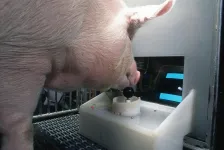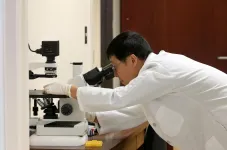(Press-News.org) Variants of nine genes increase the risk of developing Addison's disease, a rare disease in which the immune system attacks the adrenal glands. That is according to the largest genetic study to date on patients with Addison's disease. The findings help increase knowledge about what causes the disease. The study was conducted by researchers at Karolinska Institutet, Sweden, and Bergen University, Norway, and is published in the journal Nature Communications.
"By studying the single largest collection of samples from patients with Addison's disease, we've been able to carry out the first genetic study of the disease that spans the entire human genome," says Daniel Eriksson, doctor and researcher in the experimental endocrinology group at the Department of Medicine, Solna, Karolinska Institutet, who has led the study with doctoral student Maribel Aranda and docent Sophie Bensing at the Swedish Addison Registry. "It shows that variants of nine genes, many of which are central to our immune system, induce a higher risk of developing the disease."
In Sweden, roughly one in 100,000 people develops Addison's disease every year. The disease is autoimmune, meaning the immune system attacks organs and tissues, in this case the cortex of the adrenal glands, which secretes essential hormones such as cortisol and aldosterone. Given that disrupted production of these hormones can be fatal, a swift diagnosis is life-saving.
Why some people develop Addison's disease is unknown, and since the disease is rare, it has been difficult to conduct large-scale genetic studies.
For the current study, the researchers recruited a large number of patients from the Swedish and Norwegian Addison registries. DNA was isolated from more than 1,200 people with autoimmune Addison's disease and more than 4,000 healthy geographically matched individuals as the control group. They then analysed almost 7 million gene variants and found several that were significantly more common in people with Addison's disease.
Several of these variants have previously been associated with autoimmune diseases, but in one gene, the so-called AIRE gene, these variants could be specifically linked to Addison's disease. The AIRE gene is essential to the ability of T cells, an important type of blood cell in the immune system, to learn to tolerate endogenous proteins.
Compared with healthy controls, the AIRE gene, in people with Addison's disease, more often produce an AIRE protein with an additional cysteine, an amino acid that can affect the protein's function, structure and ability to bind zinc ions.
"Many autoimmune diseases have several features in common when it comes to genetic predispositions that govern the function of the immune system, but in this study we also identified distinctive genetic associations that are unique to Addison's disease," Eriksson says. "This is a step forward in our understanding of its pathogenesis."
INFORMATION:
The study was supported by grants from several bodies, including the Swedish Research Council, the K.G. Jebsen Center for Autoimmune Diseases in Bergen, the Torsten and Ragnar Söderberg Foundations, the Swedish Society for Medical Research (SSMF), the Knut and Alice Wallenberg Foundation, the Novo Nordisk Foundation and Region Stockholm.
Publication: "GWAS for autoimmune Addison's disease identifies multiple risk loci and highlights AIRE in disease susceptibility," Daniel Eriksson, Ellen Christine Røyrvik, Maribel Aranda-Guillén, Amund Holte Berger, Nils Landegren, Haydee Artaza Alvarez, Åsa Hallgren, Marianne Grytaas, Sara Ström, Eirik Bratland, Ileana Botusan, Bergithe Eikeland Oftedal, Lars Breivik, Marc Vaudel, Øyvind Helgeland, Alberto Falorni, Anders P. Jørgensen, Anna-Lena Hulting, Johan Svartberg, Olov Ekwall, Kristian Fougner, Jeanette Wahlberg, Bjørn G. Nedrebø, Per Dahlqvist, The Norwegian Addison Registry Study Group,The Swedish Addison Registry Study Group, Per Morten Knappskog, Anette Susanne Bøe Wolff, Sophie Bensing, Stefan Johansson, Olle Kämpe, Eystein S. Husebye, Nature Communications, online February 11 2021 doi: 10.1038/s41467-021-21015-8
The strange social structure of tiny fish called emerald coral gobies may be explained by family loyalty, new research shows.
Coral goby groups contain a single breeding male and female and - as "sequential hermaphrodites" - the subordinate gobies can take over either role if one of the breeders dies.
The puzzle for biologists is why breeders tolerate the smaller non-breeders sharing their space and competing for food.
One explanation is "kin selection" (favouring related individuals).
Reef fish are often assumed to disperse at random after hatching, meaning groups of adults should not be closely related, but the new study finds "positive relatedness" ...
Pigs will probably never be able to fly, but new research is revealing that some species within the genus Sus may possess a remarkable level of behavioral and mental flexibility. A study published in END ...
Peer reviewed / Review and opinion
First comprehensive assessment of damage to health inflicted by former President Trump cites decades of policy failures made worse by the Trump administration, resulting in 461,000 unnecessary US deaths annually before the COVID-19 pandemic, and tens of thousands of unnecessary COVID-19 and pollution-related deaths attributable to his actions.
Lancet Commission calls for immediate rollback of Trump's health-harming policies and additional sweeping reforms to reverse the deteriorating health of the US population: "The path away from Trump's politics of anger and despair cannot lead through past policies."
The first comprehensive assessment of the health effects of Donald Trump's presidency is published today ...
Researchers at Linköping University, Sweden, have developed biosensors that make it possible to monitor sugar levels in real time deep in the plant tissues - something that has previously been impossible. The information from the sensors may help agriculture to adapt production as the world faces climate change. The results have been published in the scientific journal iScience.
The primary source of nutrition for most of the Earth's population is mainly plants, which are also the foundation of the complete ecosystem on which we all depend. Global population ...
A tiny population of neurons known to be important to appetite appear to also have a significant role in depression that results from unpredictable, chronic stress, scientists say.
These AgRP neurons reside exclusively in the bottom portion of the hypothalamus called the arcuate nucleus, or ARC, and are known to be important to energy homeostasis in the body as well prompting us to pick up a fork when we are hungry and see food.
Now Medical College of Georgia scientists and their colleagues report the first evidence that, not short-term stress, like a series of tough college exams, rather chronic, unpredictable stress like that which erupts in our personal and professional lives, induces changes in the function of AgRP neurons that may contribute to depression, they ...
Researchers from University of Amsterdam and Stanford University published a new paper in the Journal of Marketing that examines explores how human-as-machine representations affect consumers--specifically their eating behavior and health.
The study, forthcoming in the Journal of Marketing, is titled "Portraying Humans as Machines to Promote Health: Unintended Risks, Mechanisms, and Solutions" and is authored by Andrea Weihrauch and Szu-Chi Huang.
To combat obesity, governments, marketers, and consumer welfare organizations often encourage consumers ...
Obesity and excess body fat may have contributed to more deaths in England and Scotland than smoking since 2014, according to research published in the open access journal BMC Public Health.
Between 2003 and 2017 the percentage of deaths attributable to smoking are calculated to have decreased from 23.1% to 19.4% while deaths attributable to obesity and excess body fat are calculated to have increased from 17.9% to 23.1%. The authors estimate that deaths attributable to obesity and excess body fat overtook those attributable to smoking in 2014.
Jill Pell, at the University of Glasgow, United Kingdom, the corresponding author said: "For several decades smoking has been a major target of public ...
The needs of millions of overlooked, 'left behind' adolescent women must become a more significant priority within international efforts to end poverty by 2030, a UK Government-commissioned report is urging.
The University of Cambridge report, which was commissioned by the Foreign, Commonwealth and Development Office, argues that there is an urgent need to do more to support marginalised, adolescent women in low and middle-income countries; many of whom leave education early and then face an ongoing struggle to build secure livelihoods.
Amid extensive evidence which highlights the difficulties these women face, it estimates that almost a third of adolescent ...
One third (35%) of people who took a new drug for treating obesity lost more than one-fifth (greater than or equal to 20%) of their total body weight, according to a major global study involving UCL researchers.
The findings from the large-scale international trial, published today in the New England Journal for Medicine, are being hailed as a "gamechanger" for improving the health of people with obesity and could play a major part in helping the UK to reduce the impact of diseases, such as COVID-19.
The drug, semaglutide, works by hijacking the body's own appetite regulating system in the brain leading to reduced hunger and calorie intake.
Rachel Batterham, Professor of Obesity, Diabetes and Endocrinology ...
MUSC Hollings Cancer Center researchers found that a single strain of bacteria may be able to reduce the severity of graft-versus-host disease (GVHD), as reported online in February 2021 in JCI Insight.
Bone marrow transplant can be a lifesaving procedure for patients with blood cancers. However, GVHD is a potentially fatal side effect of transplantation, and it has limited treatment options. This proof-of-concept study demonstrates that better treatment options may be on the horizon for patients with GVHD.
Xue-Zhong Yu, M.D., associate director of Basic Science at Hollings Cancer Center, and lead ...





